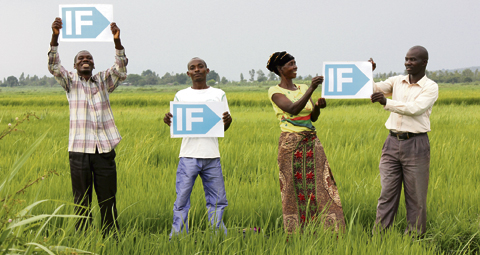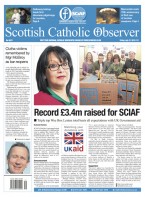January 25 | ![]() 0 COMMENTS
0 COMMENTS ![]() print
print

SCIAF’s food for thought; Faith is not a 140-character conversation
It is always good to see the Scottish Catholic International Aid Fund at the cutting edge of aid and international development.
The Catholic charity many of us knew in our younger years proved once again this week that it is as true to its mission statement today as it was when it was started in 1965 by playing an integral role in the Enough Food for Everyone IF campaign.
Hunger, a major and complex world problem, is in the firing line of this joint initiative by 100 charities who want to tackle the hunger trap that will ensnare almost a billion young people by 2025. SCIAF was at the heart of its Scottish launch on Wednesday. And while feeding those who are hungry and in crisis now as a result of famine, flood, crop failure, social unrest and the like is the most visible and understood aspect of the problem, the international government and multi-agency co-operation to tackle this predicted hunger epidemic is also an arena in which SCIAF has expertise.
As an agency of the Bishops’ Conference of Scotland, SCIAF has grown over the years and extended its reach far beyond anyone’s highest hopes into the type of development, and indeed advocacy, work that is very much required to go hand in hand with the important appeals, donations and funding. Pope Benedict XVI told Catholic charities at the weekend that ‘anthropology’ alone ‘is essentially atheist’ and that real charity ultimately arises from roots in Faith. Food for thought indeed.
Were parables the sound bites of Biblical times? In an age when people did not know leisure time, and had even less to fill it with, did Jesus have the luxury of the undivided attention of those He spoke to who hungered for an inspiring story? Compare that to today when we all have education and a seemingly infinite number of distractions to grab our attention and fill our time. As the Catholic Church, and the Holy Father himself, tap increasingly into social media (in languages now including Latin) to get the Faith message across—as observed this week by the BBC’s David Willey in Rome—does this mean that our Catechism needs to be revised to fit neatly into a 140-character paragraph or be lost to future generations?
As SCO editor Liz Leydon battled to be heard on the BBC’s The Big Questions at the weekend, it struck home that we need have no fear. Today’s Catholic sound bites are but cleverly placed entry points into Catholicism, keeping a moral, ethical and spiritual element alive in society’s consciousness. And while Biblical times relied on an oral tradition, Catholics today can count, by and large, on a literate society who can explore the Church’s written teachings at their leisure. We must pray we all choose to do so.
In this Year of Faith, Patricia Carroll’s SCO column is an ideal place to start, as is the Strong in Faith Facebook page.











